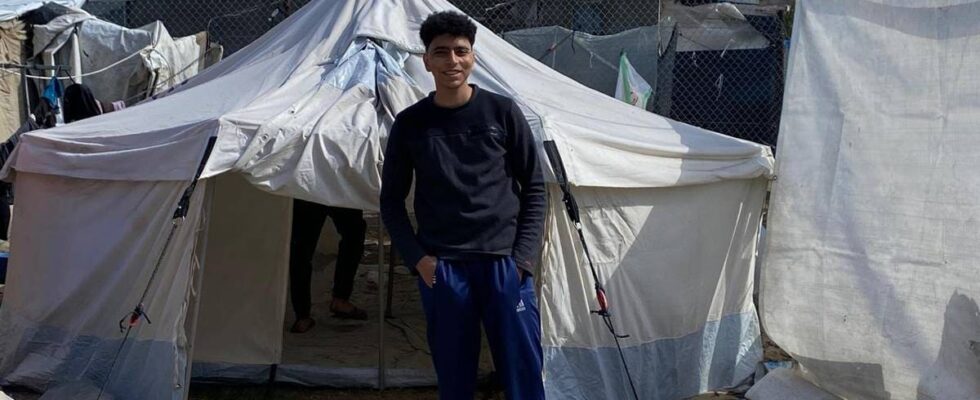– I didn’t know what to say, I couldn’t speak either English or Arabic. The tears rolled, I was so relieved. This is how Palestinian Mustafa Saleh reacted to the fact that he is still allowed to start at United World College (UWC) in Fjaler, an international secondary school for young people aged 17–19. What is United World College? Photo: Ottar Starheim / news Global education movement that brings together young people from all over the world regardless of the families’ finances UWC aims to achieve peace and sustainable development through education Students are selected on the basis of academic results, motivation and characteristics regardless of ethnicity, religion and economic background Leads to an international student exam Conduct teaching with a particular emphasis on environmental work and human rights There are 18 international secondary schools: Norway (Fjaler), Italy, Wales, Netherlands, Canada, USA, Germany, Costa Rica, Bosnia and Herzegovina, Swaziland, Singapore, Hong Kong, Armenia, China, India, Japan, Tanzania and Thailand. The school in Fjaler was started in 1995 and opened by Queen Sonja The Queen is the school’s high patron The school has around 200 students from more than 80 countries. Saleh’s entry application was initially rejected by UDI because they thought it unlikely that he would be able to return to his home country after school. He appealed the case, and yesterday the message came from the Norwegian Immigration Service (UNE). They have decided that he will still get a visa to Norway. Among other things, because the school he will attend has a good reputation as a peace high school, and because there are good opportunities for further education through scholarship schemes for UWC students. United World College is an international school located in Fjaler. Photo: Malene Laura Solheim / news Married in tears Lawyer Åsmund Mjåland confirms that Saleh will get a visa. – UNE has emphasized that he should go to UWC. Although they believe that there are weak conditions for return, they have doubted that he will get a visa for the school year. Yesterday, Mjåland was able to convey the good news to Saleh. – He broke down in tears. For my part, I also noticed that it was difficult not to be moved by the reaction. It was an enormous relief for him. When Mjåland called Saleh, he was with his sister at a shopping centre. – We started dancing and running around, became completely wild, and I hugged three completely unknown people, because I was so happy, says Saleh. Mjåland hopes that Saleh will be in place at the school within a week. Firda first wrote that the decision was changed. One pupil left Palestinian Waseem Nassar also got a place at the school. He is stuck in Gaza, and cannot visit a functioning embassy to apply for a student visa. The school in Fjaler is also not allowed to send an application on behalf of Nassar, even if he gave them authorization to do so. It is only permitted in case of family reunification, is the answer the school has received from UDI. Mjåland does not represent Nassar, but has nevertheless sent a formal inquiry to the Ministry of Justice to find out if there is any exception to the requirement to attend in order to apply for a visa. Lawyer Åsmund Mjåland was also touched when he told Saleh that he got a visa to Norway. Photo: Liv-Unni Tveitane The answer was that there are no special rules or exceptions for promoting an application. – It’s a bit of a shame, because then you prevent quite a few people from making an application for a residence permit to go to school in Norway. There is clearly a hole in the regulations as they are today. Hopes for change The students Saleh and Nassar got study places at UWC before Norway recognized Palestine as its own state, and before Palestine ended up on the UDI’s “red group” across the country. Citizens from countries in this group have more difficulty obtaining residence than countries in the green, yellow or orange group. Director of communications and public relations at UWC Red Cross Nordic, Leonora Laukeland Kleiven, is happy that Saleh is getting a visa. Photo: Malene Laura Solheim / news Director of communications and public relations at UWC Red Cross Nordic, Leonora Laukeland Kleiven, is relieved that Saleh can now come. – One can never be sure, but we have known that this is a strong case and have thought that there can be no other possibility than that Mustafa should be granted residency. Seeing it in black and white was still incredibly good. She hopes that UNE’s decision will eventually make it easier for students from red-listed countries to start at their school. – As a peace gymnasium established to bring young people from all over the world together, it is extremely important that young people also from the countries that are in difficult conflicts and at war, get that opportunity. Kleiven also hopes that UNE’s decision will facilitate Nasser also getting a visa. Mustafa Saleh is a friend of Nasser and hopes that his friend will now be able to travel out of Gaza and start at UWC, like himself. – Going to UWC means a lot and provides opportunities for the future, says Saleh, who dreams of studying computer security in the future. Published 23.08.2024, at 17.35
ttn-69
Palestinian Mustafa is still allowed to start secondary school in Norway – news Vestland

